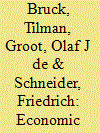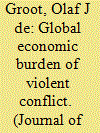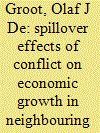|
|
|
Sort Order |
|
|
|
Items / Page
|
|
|
|
|
|
|
| Srl | Item |
| 1 |
ID:
107928


|
|
|
|
|
| Publication |
2011.
|
| Summary/Abstract |
The relationship between conflict and education has been studied before. However, previous authors have always focused strongly on the supply-side effects, whereas this article examines the influence of conflict on the demand for education. It is theoretically shown that, under relatively general conditions, individuals living in a conflict area have an incentive to increase their level of education and that this effect depends on the individual's skill level. This hypothesis is tested using the conflict in the Basque Region as a case study, which is an example of a conflict in which one would not expect strong supply-side effects. Using other Spanish regions, an artificial region is created in which the population has a similar educational distribution as in the Basque Region. When comparing the true and artificial regions, individuals with a medium education level clearly show an increase in education during the conflict, as predicted by the theoretical model.
|
|
|
|
|
|
|
|
|
|
|
|
|
|
|
|
| 2 |
ID:
109196


|
|
|
|
|
| Publication |
2011.
|
| Summary/Abstract |
In this article, we estimate the total costs of the German participation in the Afghanistan war, both past and future. This is a hugely complex and uncertain calculation, which depends on several important assumptions. These assumptions pertain to the different cost channels and the shares of these channels that can be attributed to the German participation in the war. By calculating the costs of the German participation, we provide a framework for other researchers to do the same with respect to other countries. The article can function as a roadmap for researchers focusing on this topic. In the end we find that, in the most realistic of several possible scenarios regarding the duration and intensity of the German participation in the war in Afghanistan, the German share of the net present value of the total costs of the war ranges from 26 billion Euro to 47 billion Euro. This large range reflects the uncertainties with which the costs must be estimated. On an annual basis, we estimate that the German participation in the war costs between 2.5 and 3 billion Euro. This contrasts with the official war budget, which is little over 1 billion Euro for 2010, showing that governments may not adequately represent the costs of military action.
|
|
|
|
|
|
|
|
|
|
|
|
|
|
|
|
| 3 |
ID:
184204


|
|
|
|
|
| Summary/Abstract |
Calculating the consequences of global public bads such as climate change or pandemics helps uncover the scale, distribution and structure of their economic burdens. As violent conflict affects billions of people worldwide, whether directly or indirectly, this article sets out to estimate its global macro-economic repercussions. Using a novel methodology that accounts for multiple dimensions of war, the article finds that, in the absence of violent conflict since 1970, the level of global GDP in 2014 would have been, on average, 12% higher. When disaggregating these results by conflict type, civil conflicts are estimated to have been the costliest by far. Income growth is found to be altered up to four years following the end of a conflict, although the direction of this relationship depends on the intensity and type of conflict. Countries also suffer significantly from fighting in neighbouring countries, thereby showing the importance of mitigating spillovers rapidly. The largest absolute losses associated with violence emanate from Asia, while many high-income economies are found to benefit economically from participating in conflicts on foreign soil. This analysis thus shows that, despite some evidence of a faster post-conflict growth and possible benefits for external participants, violent conflict leads to net global losses that linger long after peace is achieved, reducing the peace dividend. The article concludes by discussing public policy options to strengthen the benefits of peace as a global public good.
|
|
|
|
|
|
|
|
|
|
|
|
|
|
|
|
| 4 |
ID:
095044


|
|
|
|
|
| Publication |
2010.
|
| Summary/Abstract |
In this article, the influence of conflict on the economies of neighbouring countries is discussed. The results from previous papers show a strong negative effect for an entire area around a country suffering from conflict, but this paper reaches a different conclusion, by using more recent data and adjusting the methodology previously employed. Additionally, a new type of contiguity matrix is constructed and used in the actual analysis. The final analysis consists of a large number of regressions and concludes that conflict actually has two opposing effects. First, like conflict countries themselves, directly contiguous countries actually suffer from the negative effects of proximate conflict. Secondly, however, there is also a positive spillover of conflict, which affects non-contiguous countries and this effect is larger for countries that are closer to the conflict country. The results from the paper predominantly hold for the most violent kind of conflict.
|
|
|
|
|
|
|
|
|
|
|
|
|
|
|
|
|
|
|
|
|